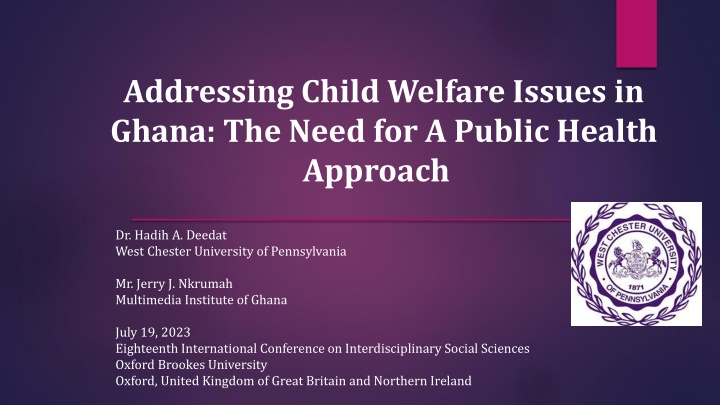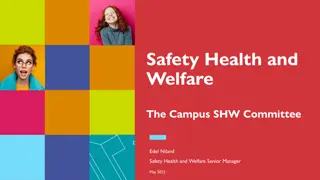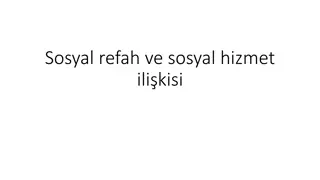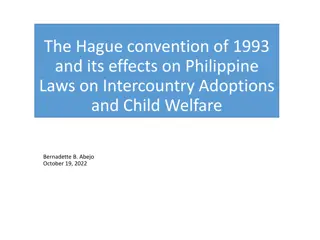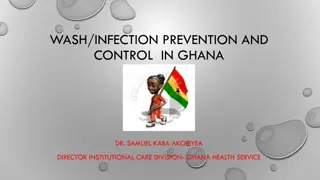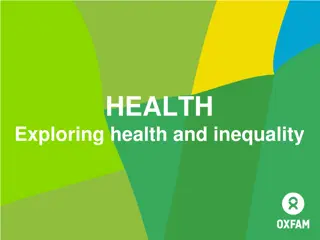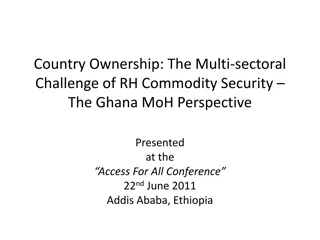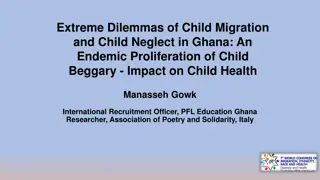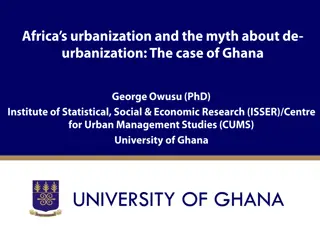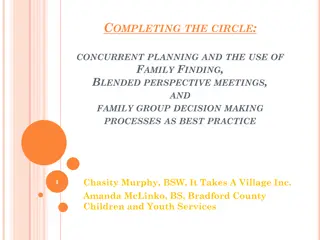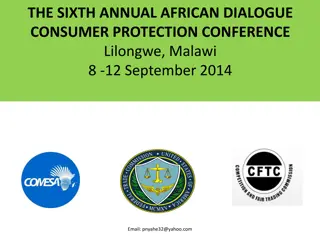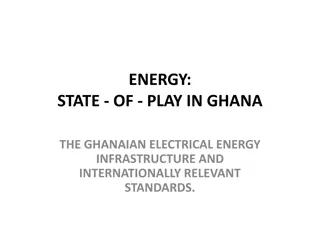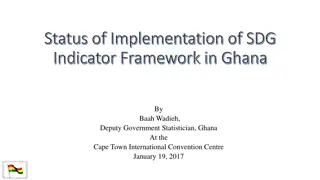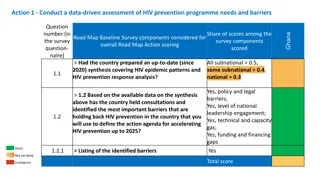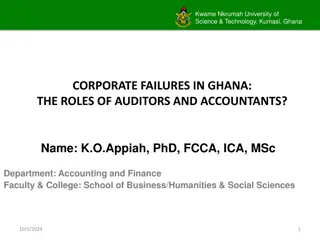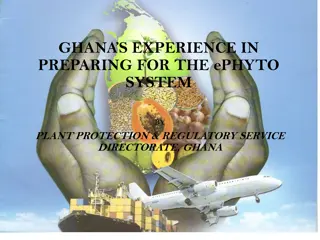Addressing Child Welfare Issues in Ghana: A Public Health Approach
Child abuse and neglect are prevalent in Ghana, necessitating a shift towards a primary prevention approach in child protection practices. Researchers aim to investigate the utilization of such methods and establish strategies for addressing child maltreatment effectively. The study emphasizes the need for prevention over intervention in Ghana's child protection system.
Download Presentation

Please find below an Image/Link to download the presentation.
The content on the website is provided AS IS for your information and personal use only. It may not be sold, licensed, or shared on other websites without obtaining consent from the author.If you encounter any issues during the download, it is possible that the publisher has removed the file from their server.
You are allowed to download the files provided on this website for personal or commercial use, subject to the condition that they are used lawfully. All files are the property of their respective owners.
The content on the website is provided AS IS for your information and personal use only. It may not be sold, licensed, or shared on other websites without obtaining consent from the author.
E N D
Presentation Transcript
Addressing Child Welfare Issues in Ghana: The Need for A Public Health Approach Dr. Hadih A. Deedat West Chester University of Pennsylvania Mr. Jerry J. Nkrumah Multimedia Institute of Ghana July 19, 2023 Eighteenth International Conference on Interdisciplinary Social Sciences Oxford Brookes University Oxford, United Kingdom of Great Britain and Northern Ireland
About the Researchers Dr. Hadih Deedat A professor of social work at West Chester University of Pennsylvania (WCUPA), USA since 2019. Holds dual master's degrees in public health and social work, and a doctoral degree in social work. Mr. Jerry Nkrumah Lecturer of Business and Communications at the Multimedia Institute of Ghana (MIG) since 2020. Holds a master s degree in international business.
Background to This Research Child abuse and neglect is prevalent in Ghana: between 12.4% and 44.4% physical and emotional abuse, and between 2.4% and 6.5% sexual abuse (UNICEF, 2015) For example, Ghanaian children continue to experience corporal punishment and other forms of physical or emotional maltreatment from their caregivers (Ministry of Gender Children and Social Protection, 2014). The WHO (n.d.) also estimates that 650,000 Ghanaians suffer from severe mental health disorders and over two suffer from moderate to mild mental health disorders some of these disorders are attributed to child abuse experiences
Background continued There is a tendency of the child protection system to focus on intervention (rescuing and removing children) less focus on prevention (supporting families in addressing dynamics associated with their presenting issue[s]) (Ghana Ministry of Gender Children and Social Protection, 2014).
Purposes of This Research To investigate whether a primary prevention approach is utilized in child protection practices in Ghana To establish strategies that can promote a primary prevention (public health) approach to addressing child maltreatment in Ghana.
Study Protocol Approvals WCUPA Institutional Review Board Ghana Health Service Ethics Review Committee
Methodology Convenience sampling A mixed-methods Quantitative data analyzed using SPSS Microsoft Excel used for descriptive analysis Qualitative data analyzed using Dedoose
Sampling continued Overall study sample size = 113 Child protection workers = 46 Healthcare workers = 66 Child Protection Workers Healthcare Workers 41% 59%
Participant Demographics Child welfare workers and healthcare workers in Ghana Drawn from three regions of Ghana Ashanti Eastern Greater Accra Sampled Regions in Ghana 33% Greater Accra Eastern 55% Ashanti 12%
Participant Demographics continued Gender Level of Education Female: 79 (70%) Male: 34 (30%) Age 50 40 Youngest: 21 Oldest: 59 21 Mean: 34 Marital Status: 2 TRAINING COLLEGE, VOCATIONAL SCHOOL, TECHNICAL SCHOOL, OTHER TRAINING SCHOOL BACHELORS MASTERS DOCTORAL OR OTHER PROFESSIONAL DEGREE Single/Never Married: 42 (37.5%) Married: 64 (57.1%) Divorced/Separated: 6 (.05%)
Participants CM-Related Work Experience Years of Practice 58 22 16 15 2 LESS THAN 1 YEAR 1-2 YEARS 3-5 YEARS 6+ YEARS UNANSWERED
Results Focus on treatment vs. prevention of CM: Treatment 63% Prevention 37% Employer-offered training on CM: Yes: 53% No: 47%
Results continued Mandated reporting of CM Yes 93% No 7% Utilization of the reporting system: Yes 43% No 57% Existence of local/national reporting system: Yes 96% No 4% Effectiveness of reporting system Yes 56% No 44%
Results continued Type of Data Collected Regular Collection of CM Data 60 50 40 30 41% yes no 20 59% 10 0 Not applicable Actual cases of child abuse or neglect Protective factors against child abuse or neglect Risk of child abuse or neglect Other
Qualitative Data Results Four Major Themes Education Awareness Not enough Public CM Campaigns Yes, but not enough Primarily local government No because of examples of child maltreatment they have witnessed People who have received training are in the minority A fair amount of people who have not received training are newly posted Lots of help & engagement Queens, Social Welfare Officers, Healthcare Workers There is higher demand than can be reached by existing staff Prioritization Training Help from Local Entities/Community Leaders
Some Poignant Participant Quotes They [government] sometimes do something about it [child maltreatment], but it is not really a major priority. We don't really hear of it unless there is an issue of child health or child abuse we hear about it, but I don't think it's a priority. The campaigns [against CM] are not much...you see some through social media, through the television, sometimes you hear one or two on the radio, but not enough for me. Radio programs are very effective [in fighting CM] because they do it through local languages and they do call-in sessions where people express their opinions and even share experiences of child abuse case that they may not even be aware of at the national level. On a scale of 10, I d say it s like a 5 or a 4. It [CM prevention effort] is not really common unless an incident happens and we hear something from some source, like on national television, social media or radio.
Discussion More focus on intervention than on prevention Primary prevention (public health approach) not prioritized Although more employees receive training on CM, training is largely focused on responding to CM, rather on preventing it Respondents acknowledge being mandated reporters, and there is a reporting system in place However, utilization of the system is very low Effectiveness of the system is questionable
Discussion continued Collection of CM data can be improved Currently collected CM data are less about risk of and protective factors for CM Public campaign efforts against CM and prioritization of CM prevention are currently insufficient Training of child welfare and healthcare personnel on CW needs improvement Community leaders and gatekeepers (queenmothers, chiefs, district assemblies, religious groups, etc.) are critical to adopting a primary prevention approach
Research and Practice Implications Future research should include additional regions of Ghana Participants should be pooled from other sectors, as various people and individuals are involved in CM issues The CM prevention approaches seen in the next two slides need adoption by the government, local leaders, and other CM prevention stakeholders
Child Maltreatment Prevention Focuses on primary prevention approaches (see next slide) Integration of community and protective factors (Child Welfare Information Gateway, 2017), including: relational skills problem-solving skills involvement in positive activities parenting competencies Caring adults positive peers positive community positive school environments economic opportunities
Source: Child Welfare Information Gateway. (n.d.). Framework for prevention of child maltreatment.
References Abdullah, A., Frederico, M., Cudjoe, E., & Emery, C. R. (2020). Towards culturally specific solutions: Evidence from Ghanaian kinship caregivers on child neglect intervention. Child Abuse Review, 29(5), 402 415. doi: 10.1002/car.2645 Child Labor Monitoring System Report. (2021). Sustaining efforts in the elimination of child labour in cocoa. Retrieved February 11, 2022, from https://crighana.org/wp-content/uploads/2022/02/CRI-GCLMRS-REPORT-2022-INSIDE- WEBBinder.pdf Cudjoe, E., & Abdullah, A. (2019). Parental participation in child protection practice: The experiences of parents and workers in Ghana. Qualitative Social Work, 18(4), 693-709. doi: 10.1177/1473325017751039 Cudjoe, E., Abdullah, A., & Chua, A. A. (2020). Children s Participation in Child Protection Practitioners Recommendations for Practice. Journal of Social https://doi.org/10.1080/01488376.2019.1596196 Cudjoe, E., Uggerh j, L., & Abdullah, A. (2020). We are consultants, not collaborators : with child protection meetings in Ghana. Children and Youth Services Review, 109. https://doi.org/10.1016/j.childyouth.2020.104748 Frimpong-Manso, K. (2021). Family Support Services in the Context of Child Care Reform: Perspectives of Ghanaian Social Workers. Child & Adolescent Social Work Journal, 38(2), 157 164. https://doi.org/10.1007/s10560-020-00729-6 Ghana Health Service, & UNICEF Ghana. (2018). Capacity and Gaps of Ghana Health Sector's Response to Child Abuse. UNICEF. UNICEF Ghana and Ghana Health Service. Retrieved July 11, 2021, from https://www.unicef.org/ghana/reports/capacity-and-gaps-ghanas-health-sector-response-child-abuse Practice in Ghana: Service Research, 46(4), 462 474. Young people s experiences
